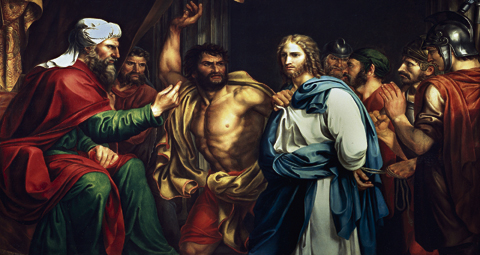April 18 | ![]() 0 COMMENTS
0 COMMENTS ![]() print
print

The transcript of our trial
Fr Ronald Rolheiser
THE Biblical accounts of Jesus’ Passion and death focus very much on His trial, describing it in length and in detail. And there is a huge irony in how it is described. Jesus is on trial, but the story is written in such a way that, in effect, everyone is on trial, except Jesus.
The Jewish authorities who orchestrated His arrest are on trial for their jealousy and dishonesty. The Roman authorities who wield the final power on the matter are on trial for their religious blindness. Jesus’ friends and contemporaries are on trial for their weakness and betrayal. Those who challenge Jesus to invoke divine power and come off the cross are on trial for their superficial faith. And, not least, each of us is on trial for our own weaknesses, jealousies, religious blindness, and superficial faith.
The transcript of the trial of Jesus reads like a record of our own betrayals.
Recently the Church has tried to help us grasp this by the manner in which it has the Passion proclaimed on Palm Sunday and Good Friday. In many churches today when the Passion is read the narrative is broken up in such a way that one narrator proclaims the overall text, another person takes the part of Jesus, several others take the parts of the various people who spoke during His arrest and trial (right), and the congregation as a whole is asked to proclaim aloud the parts that were spoken by the crowds.
This could not be more appropriate because a congregation in any Christian church today, and we, as individual members of those congregations, in our actions and in our words, in countless ways, mimic perfectly the actions and words of Jesus’ contemporaries in their weaknesses, betrayals, jealousies, religious blindness, and false faith. We too indict Jesus countless times by how we live.
For example, here is how we do it in our words. In Matthew’s account of the trial of Jesus, at a certain moment in the trial, Pontius Pilate comes out to the people, the same people who just five days before had chanted for Jesus to be their king, and tells them that according to custom, at Passover time, he is willing to release one Jewish criminal being held in custody. At the time, he had in custody a particularly infamous murderer named Barabbas. So Pilate asks the crowd: “Whom should I release for you, Jesus of Nazareth or Barabbas?” The crowd roars back: “Barabbas!” Pilate then asks: “Then what should I do with Jesus of Nazareth?” The crowd’s reply: “Away with Him. Have Him Crucified!”
We can make this, very obvious, extrapolation: In every moral choice we make, big or small, ultimately the question we are standing in front of is the same question Pilate asked the crowd: “Whom should I release for you, Jesus or Barabbas?” Graciousness or violence? Selflessness or self-centeredness?
It is the same when the crowds say to Pilate: “We have no king, except Caesar!” In saying this, they were abandoning their own messianic hopes in favour of a momentary security. We say the same thing every time when, for our own well-being, we sell-out our higher ideals and settle for second best.
As well, all too frequently, we mimic the words of the crowds who challenged Jesus as He was hanging on the cross with these words: “If you are the Son of God, come off the cross, save us, and save yourself.” We do this every time we let our prayers become a test of God’s existence and goodness; if we get a positive answer, God loves us, if not, we begin to doubt.
It is the same, of course, with our actions: Like Jesus’ disciples, we tend to stay with Jesus more when things are going well, when temptation is not too strong, and when we are not facing real, personal threat. But, like Jesus’ original followers, we tend to abandon and betray when things get hard and threatening.
Moreover, like the authorities who come to arrest Jesus carrying lanterns and torches, we also often prefer artificial light to the Light of Lights; just as, like those who arrested Jesus, we tend to approach the Prince of Peace carrying clubs and swords, ready for a fight.
Generally, on reading the account of Jesus’ Passion and Death, our spontaneous inclination is to judge very harshly those who surrounded Jesus at His arrest, trial, and sentencing: How could they not see what they were doing? How could they be so blind and jealous? How could they choose false security over God’s ultimate shelter? A murderer over the Messiah? How could His followers so easily abandon Him?
Not much has changed in 2000 years. The choices that those around Jesus were making during His trial and sentencing are identical to the choices we are still making today. And most days we are not doing any better than they did because, still, far too often, given blindness and self-interest, we are saying: ‘Away with Him! Crucify Him!’
— Fr Ronald Rolheiser is a Catholic priest and member of the Missionary Oblates of Mary Immaculate. He is president of the Oblate School of Theology in San Antonio, Texas.
— www.ronrolheiser.com










